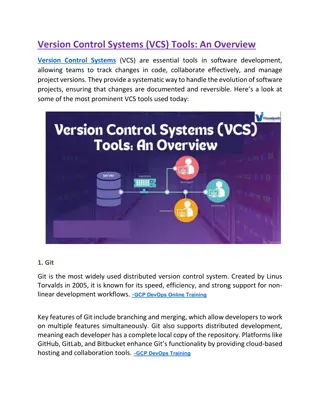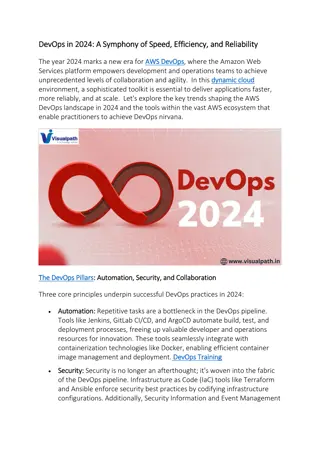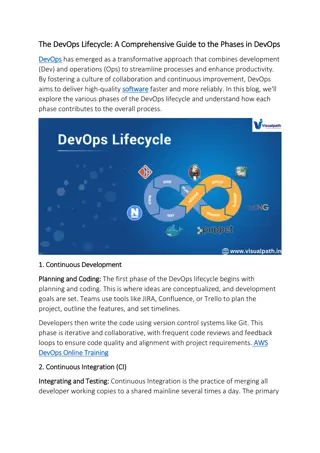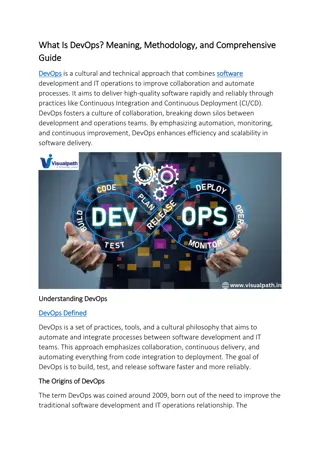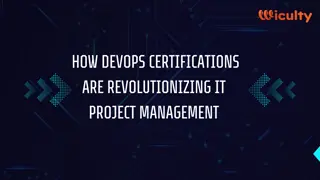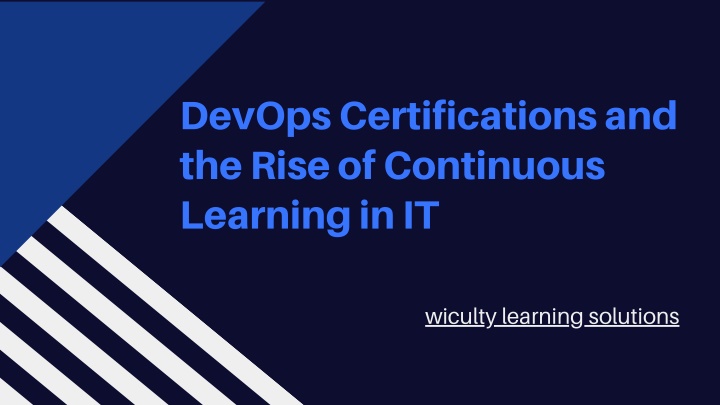
DevOps Certifications and the Rise of Continuous Learning in IT
The rise of DevOps certifications and the emphasis on continuous learning are reshaping the IT landscape. As organizations strive for greater efficiency and innovation, the demand for skilled DevOps professionals will continue to grow. By embracing continuous learning and obtaining relevant certifications, IT professionals can not only advance their careers but also contribute significantly to their organizations' success. At Wiculty Learning Solutions, we are committed to supporting your journey towards becoming a proficient and certified DevOps professional.
Download Presentation

Please find below an Image/Link to download the presentation.
The content on the website is provided AS IS for your information and personal use only. It may not be sold, licensed, or shared on other websites without obtaining consent from the author. If you encounter any issues during the download, it is possible that the publisher has removed the file from their server.
You are allowed to download the files provided on this website for personal or commercial use, subject to the condition that they are used lawfully. All files are the property of their respective owners.
The content on the website is provided AS IS for your information and personal use only. It may not be sold, licensed, or shared on other websites without obtaining consent from the author.
E N D
Presentation Transcript
DevOps Certifications and the Rise of Continuous Learning in IT wiculty learning solutions
In today's fast-paced technological landscape, staying ahead of the curve is more crucial than ever for IT professionals. DevOps, a combination of development and operations, has emerged as a pivotal methodology driving innovation, efficiency, and collaboration in software development and IT operations. As organizations increasingly adopt DevOps practices, the demand for skilled professionals has surged, leading to a significant rise in the popularity of DevOps certifications. These certifications are not merely a testament to one's skills and knowledge but are also key to fostering a culture of continuous learning in the IT sector.
The Growing Importance of DevOps DevOps bridges the gap between software development and IT operations, promoting a culture of collaboration, automation, and continuous delivery. This approach helps organizations deliver high-quality software faster and more reliably, meeting the ever-evolving demands of the market. The core principles of DevOps include: 1. Collaboration and Communication: Breaking down silos between development and operations teams. 2. Continuous Integration and Continuous Deployment (CI/CD): Automating the integration and deployment processes to ensure rapid and reliable releases. 3. Infrastructure as Code (IaC): Managing and provisioning infrastructure through code for consistency and scalability. 4. Monitoring and Logging: Continuously monitoring systems to identify and resolve issues swiftly.
The Surge in DevOps Certifications Some of the most sought-after DevOps certifications include: 1. AWS Certified DevOps Engineer Professional: Validates expertise in provisioning, operating, and managing distributed application systems on the AWS platform. 2. Certified Kubernetes Administrator (CKA): Focuses on skills related to managing Kubernetes clusters, a crucial component of modern DevOps environments. 3. Docker Certified Associate (DCA): Demonstrates proficiency in Docker, an essential containerization technology used in DevOps. 4. Microsoft Certified: DevOps Engineer Expert: Recognizes expertise in combining people, process, and technologies to continuously deliver valuable products and services.
Benefits of DevOps Certifications 1. Career Advancement: DevOps certifications are a testament to an individual's expertise and commitment to continuous learning, making them highly attractive to employers. 2. Skill Enhancement: The certification process equips professionals with the latest tools, techniques, and best practices in the DevOps domain. 3. Increased Earning Potential: Certified DevOps professionals often command higher salaries due to their specialized skills and knowledge. 4. Job Security: With the growing adoption of DevOps practices, certified professionals are more likely to find stable and rewarding career opportunities.
The Role of Continuous Learning in IT The IT industry is characterized by rapid technological advancements, necessitating a culture of continuous learning. For DevOps professionals, staying updated with the latest trends, tools, and practices is crucial. Continuous learning involves: 1. Regular Training and Certifications: Pursuing new certifications and attending workshops to stay abreast of the latest developments. 2. Hands-on Practice: Engaging in practical projects and experiments to apply theoretical knowledge in real-world scenarios. 3. Community Engagement: Participating in DevOps communities, forums, and conferences to exchange knowledge and experiences with peers. 4. Staying Informed: Following industry news, blogs, and publications to remain aware of emerging trends and technologies.
Conclusion The rise of DevOps certifications and the emphasis on continuous learning are reshaping the IT landscape. As organizations strive for greater efficiency and innovation, the demand for skilled DevOps professionals will continue to grow. By embracing continuous learning and obtaining relevant certifications, IT professionals can not only advance their careers but also contribute significantly to their organizations' success. At Wiculty Learning Solutions, we are committed to supporting your journey towards becoming a proficient and certified DevOps professional.
Thank you! wiculty learning solutions








